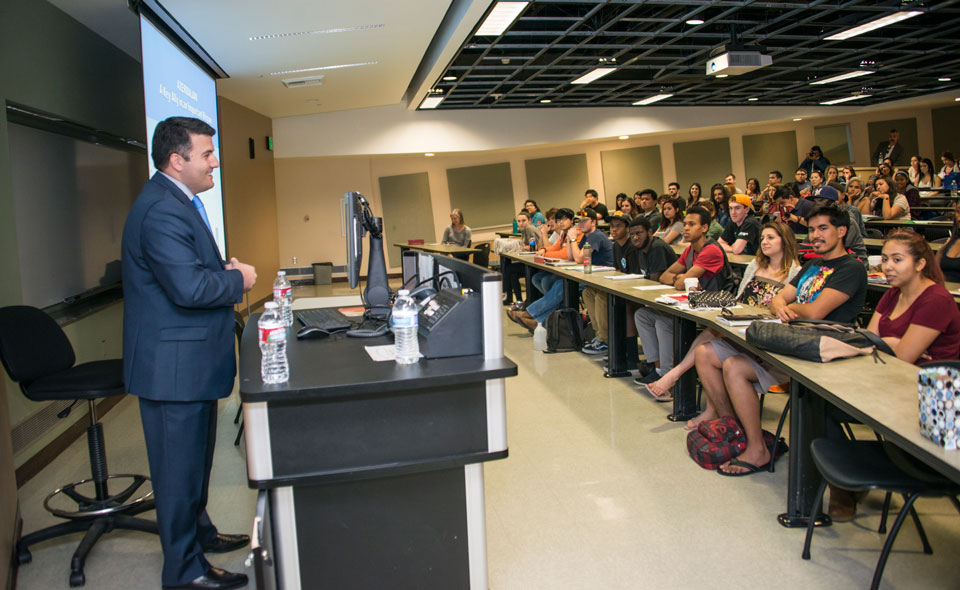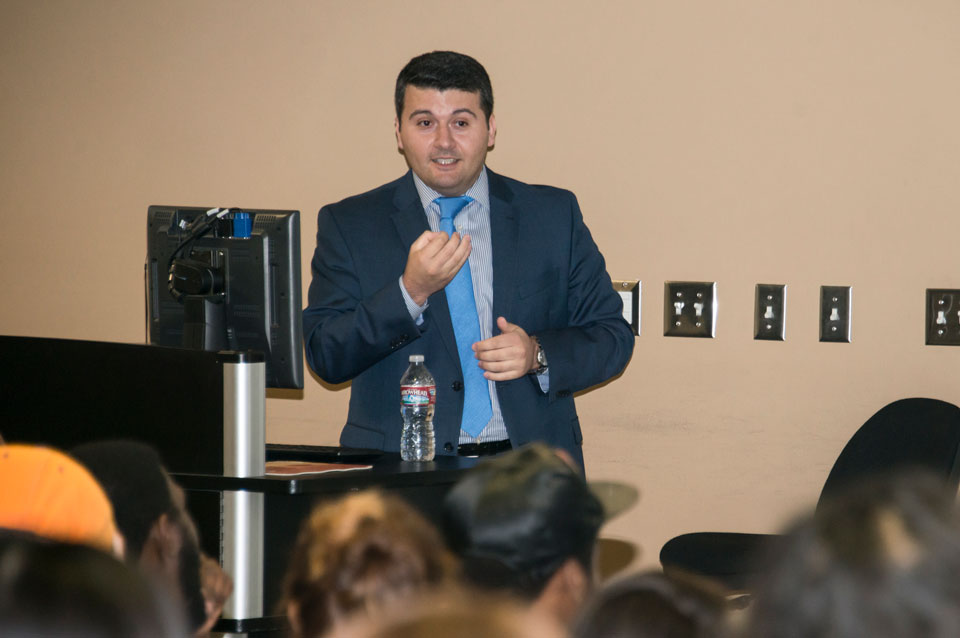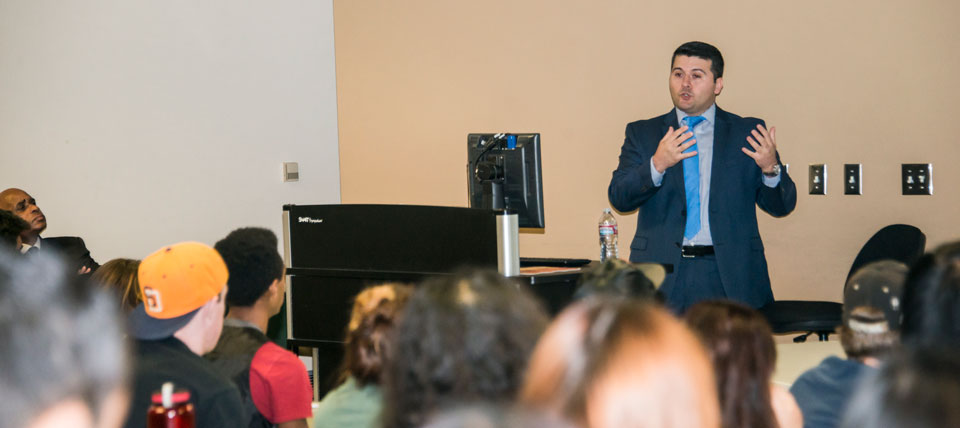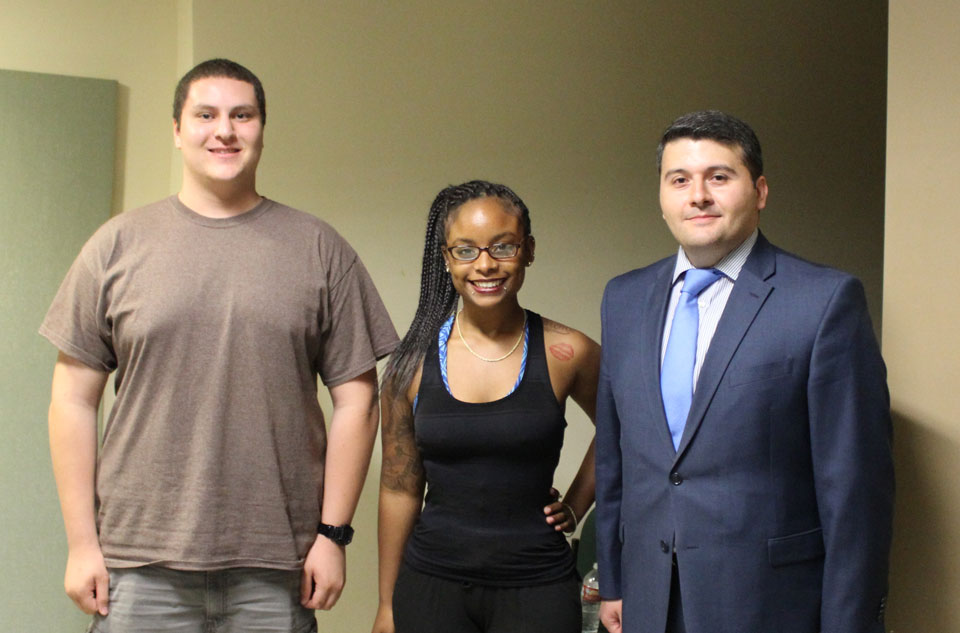Azerbaijan Diplomat’s Campus Visit Gives CSUN Students Lesson in Civil Discourse
It started as a rare opportunity for local college students to meet and learn from a top-level foreign dignitary from a nation halfway across the globe. What followed was more than their political science professor could have dreamed: a real-life practicum in free speech, civil discourse and diplomacy in action.
California State University, Northridge undergraduates last week had the opportunity to hear from and question guest speaker Nasimi Aghayev, consul general of Azerbaijan for the Western United States. Aghayev, who serves as the top diplomat in California and 12 other states, spoke to about 120 students in professor James Mitchell’s political science class, “American Political Institutions.”
A tiny country — with a population of 9.3 million people and covering an area about the size of Maine — Azerbaijan is a former Soviet republic, a longtime U.S. ally, and the only country to border both Iran and Russia. Located in the Caspian Sea region, the country is, like its massive neighbors, rich in oil and strategically located.
Azerbaijan provided military support to United States forces in Iraq and continues to do so in Afghanistan. It also supplies “energy security” via oil and natural gas to the United States, Israel and Europe, Aghayev told students during his March 16 presentation, “The Art of Alliances.”
The consul general showed a brief PowerPoint presentation on his country’s architecture, multiculturalism and history, including its struggle for independence in the early 1990s after the fall of the Soviet Union.
“Our neighbor Armenia presented the biggest challenge,” Aghayev said, noting the cease-fire that has been in place since 1994 between the two warring nations. He also described “ethnic cleansing” and massacres of civilians by Armenian troops — including one in 1992 in the town of Khojaly (whose circumstances the Armenian community vigorously disputes).
After the brief presentation, Aghayev invited questions from the class. Mitchell’s students were ready. In email exchanges leading up to the class, Aghayev’s staff had indicated that “no questions were off limits,” and their professor had encouraged the undergraduates to present well-researched, hard-hitting questions about the region’s troubled history. Several students posed questions to the consul general about the U.S.-Azeri alliance, and how the conflict with Armenia affects Azerbaijan’s relationship with Russia.
In the final question before class time was up, a young woman, reading from her notes, asked Aghayev to comment about “war acts carried out by Azerbaijani troops against Armenian civilians.”
Aghayev seemed to deflect the question, but noted that Azerbaijan is “still pursuing peace.
“There are very smart Armenians in the U.S. who understand how tragic this situation is and speak out about it,” he said, referring to Armenia’s conflicted history and the mass migration of Armenians to California — many to the San Fernando Valley. “We want to help Armenia get out of this situation of depopulation.
“The goal shouldn’t be to be obsessed with history, but to focus on the future … and to develop tolerance and develop peace,” Aghayev said before departing. “I think we can resuscitate that trust that once existed and find peace.”
The Armenian-American students in the classroom, however, did not leave with a feeling of trust — nor, apparently, of peace. By the following morning, March 17, Mitchell said, he found his email inbox filled with a number of protest letters from the local Armenian community and student groups.
With about 10 percent of its student body of Armenian heritage, CSUN has the largest Armenian student population of any university outside the Republic of Armenia. The university also boasts an Armenian Studies Program (established in 1983), an Armenian language minor, and about 170 Armenian staff and faculty.
A representative of the CSUN Armenian Students’ Association (ASA), Alina Sarkissian, contacted Mitchell to protest Aghayev’s presentation on campus. Mitchell quickly arranged for Sarkissian and ASA President Christine Dashdemirians to discuss the matter in his office. Now, they are working to invite a follow-up guest speaker to the professor’s political science class to provide the Armenian point of view.
“Having received [the complaints], I must say, makes me see the value of the occasion even more,” Mitchell said last week. “A big part of the intellectual and personal development of these students involves not just tolerance, but respect for diverse points of view. The challenge that this poses for some in the class does much more than any lecture that I could have ever given them on the First Amendment.
“It was a chance for CSUN students to be exposed to someone new. I encouraged them to ask hard questions — in fact, I made it a point to call on someone for the last question who I knew would ask something tough about genocide. I am teaching my students about freedom of speech and tolerance, fundamental American principles.”
The CSUN ASA members agreed with Mitchell’s intentions and having a presentation by a foreign diplomat, said Sarkissian, a 22-year-old senior and business management major.
“We would never barrage on Constitutional and First Amendment rights, but we wish Professor Mitchell had taken the initiative himself to schedule a reputable Armenian speaker to come to the same class Consul General Aghayev spoke in,” said Sarkissian, who served as CSUN ASA president from 2013-14.“Nonetheless, Professor Mitchell has been incredibly receptive and communicative since we first contacted him about this issue, and we are deeply appreciative of the strong working relationship we have built with him.”
Last week’s experience, and the discussion it spurred, reminded Mitchell just how important the job of a university professor is, he said.
“I do not think that I ever fully appreciated it. We are the last defense against fascism. I know that others do not mean to but, when [they] call for views or facts — with which [they] disagree — to be shut out of the public discourse, [they] are calling for fascism. That is no different than extremists all over the world.
“It is our responsibility, perhaps our most important responsibility, to keep the dialogue open, against all of the naysayers.”
Responding to students and staff in the CSUN community, Mitchell noted his pride in his undergraduate class, which “behaved with courtesy, grace and class by listening attentively.”
In the Department of Political Science, Mitchell teaches courses such as International Relations, International Politics and Foreign Policy, as well as serving as the coordinator for CSUN’s African Studies Program in the College of Social and Behavioral Sciences. He also served as J. William Fulbright Professor at the University of Bucharest, Romania.
Aghayev has served as consul general of Azerbaijan in Los Angeles since 2012. Previously, he served as the counselor for political and public affairs at Azerbaijan’s embassy in Washington, D.C. He also has served at the country’s embassies in Austria and Germany, and as a visiting scholar at the University of Toronto.
The CSUN ASA has proposed bringing in an Armenian speaker to address the history of the regional conflicts in the Caucasus. Working with the student association, Mitchell has sent letters of invitation to Robert Avetisyan, the permanent representative to the Republic of Nagorno-Karabakh, as well as to Tigran Sargsyan, ambassador of the Republic of Armenia to the U.S. Both diplomats are based in Washington, D.C. For his part, Mitchell sounded thrilled.
“This has been a marvelous First Amendment practicum,” he said.
For more on Azerbaijan, including the Consulate General in Los Angeles, visitwww.azconsulatela.org. For more information on CSUN’s Armenian Students’ Association, visit www.csun-asa.org.





 experience
experience